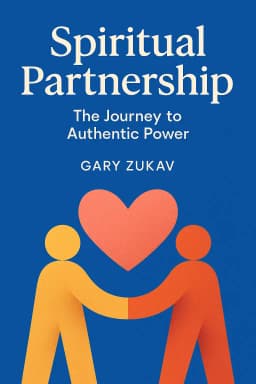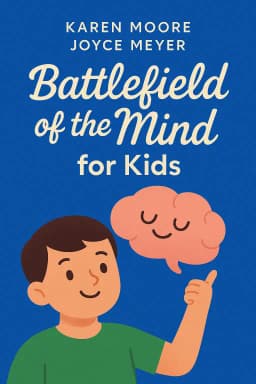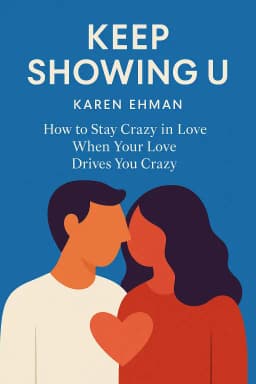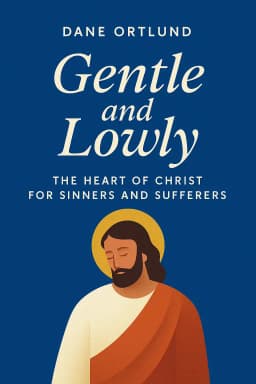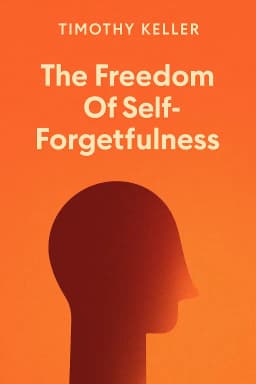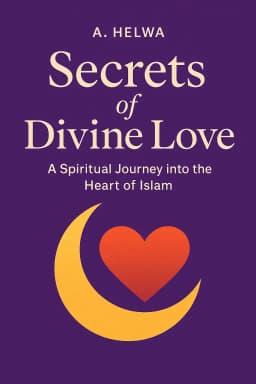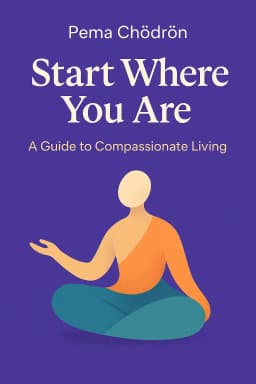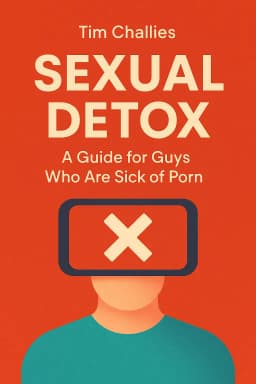
Why We Choose the Cookie
A Guide for Guys Who Are Sick of Porn
Golden Hook & Introduction
SECTION
Daniel: Okay, Sophia. Five-word review for a book called Sexual Detox. Go. Sophia: Hmm. That’s a challenge. Okay: “Your heart’s beliefs are the problem.” Daniel: Ooh, deep. I like it. Mine is: “Your brain is lying to you.” Sophia: I think both work perfectly. It’s a book that’s surprisingly less about just stopping a behavior and more about a total rewiring of your internal operating system. Daniel: Exactly. And that’s a perfect entry point for today's book, Sexual Detox: A Guide for Guys Who Are Sick of Porn by Tim Challies. And what's fascinating is that Challies isn't a psychologist or a therapist; he's a Canadian pastor and a long-time, very influential Christian blogger. So his entire approach comes from a spiritual and theological angle, not a clinical one. Sophia: Which completely explains the tone. It feels less like a medical manual and more like a… philosophical intervention. It’s highly rated within its community, but it’s definitely coming from a very specific worldview. Daniel: It is. And his central diagnosis is that this problem, for so many, isn't a behavioral issue at its core. It's a belief problem. He illustrates this right at the start with a fantastic story about chocolate chip cookies.
The Core Misbelief: Why We Choose the Cookie
SECTION
Sophia: Okay, I’m intrigued. How do you get from pornography to chocolate chip cookies? Daniel: Well, the foreword tells this story of a group of guys brainstorming for the book. One of them, Steve, is a great baker and brings out these warm, half-cooked, gooey chocolate chip cookies. He puts the plate right in front of another guy, John, who is a diabetic. Sophia: Oh, that’s just cruel. A classic temptation scenario. Daniel: Exactly. And the book poses the question: if John eats the cookie, why does he do it? It’s not because he doesn't know it's bad for him. He has all the information. He knows about blood sugar, long-term health consequences, all of it. He eats it because, in that specific moment, he believes the immediate pleasure of that gooey cookie is better, more real, and more satisfying than the abstract, future pleasure of good health and obedience to his doctor’s advice. Sophia: That’s a great analogy. It’s like knowing junk food is bad for you, but in the moment, the belief that 'this greasy burger will make me happy right now' completely overwhelms the belief that 'a salad will make me healthy in the long run'. The immediate belief wins. Daniel: Precisely. Challies’ core argument is that sexual sin operates on the exact same principle. He has this quote that cuts right to the heart of it: "When you indulge in sexual sin, it reveals what you truly believe about sexuality." You’re acting on a deeply held, maybe even subconscious, belief that what you’re choosing is better than what God offers. Sophia: But is it really a conscious belief? Or is it more of a primal, overwhelming biological urge that just bypasses the whole belief system? I think a lot of people would say they don't believe it's better, they just feel powerless to stop. Daniel: That’s the key distinction the book makes. The belief might not feel like a carefully reasoned philosophical position, but it's the operating principle your heart defaults to under pressure. It's the story you tell yourself in a split second to justify the click. The book argues that you don't truly feel powerless until you've already decided, on some level, that the forbidden thing holds a greater promise of satisfaction. The battle is lost in the belief before it's ever lost in the behavior. Sophia: Huh. So the fight isn't at the moment of temptation, it's in the daily work of re-educating your heart about what is actually, truly good. You have to believe the salad is better before the burger even shows up. Daniel: You’ve got it. It’s about changing your desires, not just managing them. And this reframes the entire problem. It’s not about a lack of willpower; it’s a crisis of worship. You’re valuing the creation—the fleeting pleasure—more than the Creator and his design. Sophia: That’s a much heavier diagnosis than just ‘you have a bad habit.’ It implies the problem is much deeper, but also that the solution has to be deeper too. Daniel: And that’s exactly where the book goes next. If the problem is a faulty belief system, the solution has to be a complete "detox" of the mind and soul.
The Two-Part Detox: Hating the Monster, Loving the Gift
SECTION
Sophia: Okay, so if the problem is a faulty belief system, the solution must be to change the beliefs. How does Challies propose we do that? It can't be as simple as just deciding to believe something new. That never works. Daniel: It’s a two-part process, and it’s anything but simple. The first part of the detox is learning to truly hate the sin. And not just because it’s "wrong," but because you begin to see it for the "monster" it truly is. The book uses some really stark language here. It says, "You will never stop until you begin to see the monstrous nature of the sin you are committing." Sophia: What does he mean by "monstrous"? I think for many, it feels like a private, victimless act. Daniel: The book directly attacks that idea. It argues pornography is "inherently violent, inherently unloving." It tells a story about a feminist writer who was comfortable with casual sex but found that men increasingly just wanted her to act out porn scenes. They weren't interested in her, in connection, or in tenderness. She said she felt used, objectified, like a prostitute. The book’s point is that porn trains the brain to see people as objects for conquest, not partners for union. Sophia: That’s a powerful story. It shifts the focus from the user's private experience to the real-world impact on how people, especially women, are viewed and treated. Daniel: It also points to data from the book SuperFreakonomics, which studied the economics of prostitution. The economists found that sex acts that were once considered taboo and therefore expensive became cheaper over time, which they linked to those same acts becoming mainstream in pornography. Challies uses this to argue that porn is always progressive. It’s never satisfied. It constantly pushes boundaries toward more extreme, more degrading content. He quotes the proverb, "Sin is always progressive, and Sheol is never satisfied." Sophia: Wow. So part one of the detox is a brutal reality check. It’s about stripping away the illusion that this is a harmless private pleasure and seeing it as a destructive force that dehumanizes others and corrupts your own soul. Daniel: Exactly. But that’s only half the battle. You can't just create a vacuum. Hating the bad isn't enough; you have to fall in love with the good. This is the second part of the detox: replacing the lies with a positive, compelling, and beautiful vision of sex as a gift from God. Sophia: This is where the book moves from the negative to the positive, right? The "Three Gifts of Sex" chapter. Daniel: Yes. And this is where the book offers a vision of what sexuality is for. First, he says sex motivates joyful obedience. A man’s desire for his wife is a God-given motivation to pursue her, cherish her, and build a life with her. Second, and this is a point that has drawn some criticism, he says it strengthens a husband's leadership. Sophia: Right, I was going to ask about that. That’s where the book’s complementarian view comes in, the idea of the husband as the head of the household. That’s a very controversial idea for many modern readers. How does the book frame that without it sounding like the wife's role is just to submit to his desires? Daniel: It's a delicate point, and the book's reception reflects that. Challies, writing from his pastoral and theological framework, argues that this leadership isn't about domination but about loving initiative. The husband is called to love and care for his wife so deeply and selflessly that it draws her toward him, creating a desire for intimacy. It’s a leadership of service, not of demand. But you're right, for readers outside that specific theological tradition, that language can be a major hurdle. Sophia: It’s a good example of how a reader’s background really shapes how they’ll receive this book. What’s the third gift? Daniel: The third gift is that sex enhances true freedom. He says that within the boundaries of marriage, sex is meant to be "alluring and even captivating," putting a powerful emotional seal on the relationship. This captivation, he argues, isn't bondage; it's a unique kind of freedom and joy that can only be found within those committed boundaries. Sophia: So the detox is a full-scale renovation. Tear down the monstrous, distorted view of sex peddled by the world, and in its place, build this beautiful, God-designed structure of sex as a gift that fosters intimacy, service, and freedom within marriage. Daniel: That's the vision. It’s an incredibly high bar, and it leads directly to a huge, and often dangerous, myth that the book is absolutely determined to bust.
The Lifelong War: Why Marriage Isn't a Magic Pill
SECTION
Sophia: Let me guess. The myth is that if you just get married, the problem will magically go away because you now have a "legitimate" outlet for sex. Daniel: You nailed it. The book calls this "The Illusion of 'Marriage as a Cure'," and it's one of the most critical points. It tells the story of a young man named Mark who is convinced that getting married will solve his pornography addiction. And at first, it seems to work. But after a few months, especially during times of stress or conflict, the old habits and temptations come roaring back. Sophia: That’s such a crucial point. So many people must pin all their hopes on marriage as a fix, and then feel like a total failure, and heap shame on their spouse, when the struggle continues. Daniel: It’s a recipe for disaster. Challies makes a profound point here. He says, "There needs to be more than a replacement of the physical, mechanical part of sex. There needs to be a replacement of the spiritual part." Simply swapping one act for another doesn't address the underlying belief system we talked about earlier. The spiritual battle that fueled the addiction is still there. Sophia: So marriage isn't the finish line; it's just a new battlefield. Daniel: A new and arguably more complex battlefield, because now your struggle directly impacts another person in the most intimate way. This is where the book gets incredibly raw. Challies shares that through his online ministry, he receives these tragic emails from women in their 40s and 50s. Sophia: Oh wow. What do they say? Daniel: They tell these heartbreaking stories of how their husbands’ pornography habit, which started when they were young, never went away. It just went underground. And over decades, it slowly eroded the trust, the intimacy, and the life from their marriage. They describe this deep, aching emptiness, wishing their husbands could be the men they were meant to be. It’s a stark warning that this sin has a very long, very destructive half-life. Sophia: That’s just devastating. It completely shatters the idea that this is a "youthful phase" you just grow out of. It proves that if the root—the belief system—isn't dealt with, it will continue to bear poison fruit for a lifetime. Daniel: And that’s why the final part of the book is about the soul. It’s about the ongoing, lifelong process of "putting off the old, and putting on the new." It requires constant vigilance, repentance, and a commitment to community—seeking help from pastors, mentors, and friends. It's not a detox you do once; it's a way of life you commit to forever.
Synthesis & Takeaways
SECTION
Daniel: When you pull it all together, the book presents this really cohesive, three-part journey. First, you have to get the diagnosis right: it’s a problem of belief, not just behavior. You’re choosing the cookie because you believe it’s better. Sophia: Then, the treatment is a two-front war. You have to learn to hate the lie by seeing the true monstrosity of porn, while at the same time learning to love the truth by embracing this beautiful, if challenging, vision of sex as a divine gift. Daniel: And finally, the prognosis is that this is a lifelong condition to be managed with spiritual discipline and community. Marriage isn't a cure, and there are no quick fixes. It’s a commitment to a different way of believing, and therefore a different way of living, for the rest of your life. Sophia: You know, what’s so powerful about that framework is that it lifts the conversation out of just shame and willpower. It frames it as a deeply human, almost epic, struggle over a fundamental question: What is truly good? What is truly beautiful? And where do we find real, lasting joy and freedom? Daniel: That’s it exactly. The book is really asking you to consider that God’s design, with all its boundaries and demands, might actually lead to more profound pleasure and deeper freedom than the seemingly boundary-less world of instant gratification. Sophia: So the ultimate question the book leaves you with is: What do you truly believe brings you more joy? The fleeting, isolating promise of a screen, or the difficult, messy, but ultimately unifying reality of a committed, loving relationship? It’s a question that goes way beyond just this one issue. Daniel: It really does. It’s a question about what you worship, and what you think your life is for. And we'd love to hear what you think. What ideas from this resonated, or what did you find challenging? Join the conversation on our community channels. Sophia: This is Aibrary, signing off.
